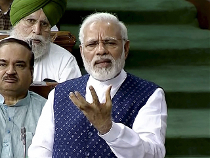NEW DELHI: Prime Minister Narendra Modi will interact with young entrepreneurs, including startup founders and CEOs, later this month to get their views on policymaking in the first such exercise in the country.
The NITI Aayog has shortlisted 150 names each to participate in two meetings that the PM will chair: first on August 17 with young entrepreneurs and the next on August 22 with young CEOs.
The participants have been selected from all over the country and across sectors. The idea is to incorporate fresh and innovating thinking into policy making.
“For further accelerating the growth process as well as realising the vision of Sabka Saath, Sabka Vikaas, it is imperative that the dynamism, resources and innovative spirit of the leaders in private sector is focussed towards the emerging opportunities and challenges in the Indian economy,” NITI Aayog CEO Amitabh Kant said in a letter to those shortlisted for the events.
“NITI is organising an interactive session between the prime minister and a group of highly motivated, dynamic, young and progressive entrepreneurs of private sector who have demonstrated a passion for transforming India and are emerging as champions of change for the country,” Kant said.
The 150 shortlisted young entrepreneurs would be segregated into six thematic groups: New India 2022, Digital India, Emerging a Sustainable Tomorrow, Health and Nutrition, Education and Skill Development, and Soft Power.
Likewise, the young CEOs would deliberate on six subjects: New India by 2022, Make in India, Cities of Tomorrow, World Class Infrastructure, Doubling Farmers’ Income and Financial Sector Reforms.
The event is likely to see the private sector committing on job creation, income enhancement and technology disruption and innovation while seeking government support on ease of doing business and governance and policy.
Each group would brainstorm through the morning, generating an action plan on its respective theme. This would cover topics such as the desired policy interventions by central and state governments, private sector contributions and disruptive tech that could guarantee inclusive development.
The plans would then be presented before the PM and some of those could find their way into government policies
Article Source: Economic Times

